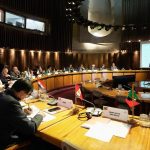Anxieties are heightening in the region about the shocking levels of violence and political instability in Haiti, with Jamaica and the United Nations (UN) amplifying calls for action now from countries that have the resources to intervene.
Against the background of the sociopolitical conditions, including worsening food insecurity, there are also fears of a spillover, which could potentially destabilise the region.
Speaking at a joint press conference with UN Secretary General Antonio Guterres at Jamaica House on Monday, Prime Minister Andrew Holness said countries have been slow to action because they want assurances.
“It’s not that our pleas have fallen on deaf ears. It is being heard and listened to. The question is the pace of action, and countries who would want to support would also want to be assured that there is a political process in place that could yield an end result in a time frame that makes sense, in terms of making a commitment. And so, there is a step that has to be taken, which is building towards political consensus,” Holness said after a meeting with Guterres.
He said that, “Caricom and Jamaica are playing an active role in trying to get to that consensus point, so the endgame of any form of support is clear… We are making some progress in that regard, but clearly there should be more tangible effort in terms of what we are doing,” Holness said.
Guterres described the conditions in Haiti as “a tragic, tragic situation”, pointing to the complexity of the humanitarian needs, compounded by “a political system that is paralysed”. He said, added to that, the appalling levels of violence by gangs, and the dramatic food insecurity are issues that all need a much stronger commitment by the international community.
The UN head was in the island from May 14-15 on a working visit.
Commending Jamaica on its efforts to assist in the process, Guterres pointed to the reluctance from countries that have a stronger capacity to lead the kind of operation that is necessary.
“It is more a police operation than anything else. The only way to overcome this reluctance is to put in place a political process that is credible, and that is why the Jamaican initiative is so important. I’m not saying that it will be automatic. What I’m saying is that we are in a kind of a stalemate now, and I hope that if we can make a political process move forward positively, we will be able to overcome the stalemate, but I strongly appeal to those countries that have the capacity to be ready to do so,” he said, stressing that Haiti is not only a problem for Haitians, but the region as a whole.
“We have a political problem — the need to bring the different stakeholders together to find the political way for a legitimate government to be recognised by all,” he said, noting a proposal made to the UN Security Council that it may be necessary — with support, equipment, and training of Haiti’s police force — to have an international robust police force to crack down on the gangs, and in parallel with a political process to create the conditions for a team to be able to address the situation.
In February, ahead of diplomatic week, Holness led a special mission to Haiti to sit down with stakeholders, including political parties, private sector, religious and civil society groups, in a move to pave a path for consensus building for the restoration of political and security stability in that country.
Last month, newly appointed UN special representative for Haiti Maria Isabel Salvador called attention to the rapidly worsening situation in her first briefing to the Security Council.
She said further delay in dealing with the situation could affect the region. “Time is of the essence, and the Haitian people deserve your urgent action. If not supported, the vicious circle of violence, political, social, and economic crisis, in which the people struggle every day, will continue to turn,” a UN news report quoted Salvador.
The UN estimates that almost half the Haitian population (5.2 million people) are in need of humanitarian aid. The instability in the Caribbean country is happening simultaneously with a cholera epidemic which broke out last October, and according to the Pan American Health Organization had surged to more than 38,000 suspected cases up to mid-April.
Last Thursday, the United Nations Children’s Fund (UNICEF) reported that the gang violence ravaging Haiti has led to more than 115,000 children facing the possibility of starving to death this year.
Rival gangs have taken control of most of the capital Port-au-Prince as Haiti has been gripped by a political and economic crisis since the assassination in July 2021 of President Jovenel Moise.
UNICEF has said it urgently needs $17 million to respond to the crisis, including to support the detection of malnutrition and to purchase food and other treatments.
Without such interventions, “the situation could further deteriorate between now and October”, UNICEF said.
Last Tuesday, the UN said that more than 600 people died in gang violence in April in a “new wave of extreme violence” that has left Port-au-Prince especially hard-hit.
The UN has repeatedly called on the international community to send a specialised armed force to help Haiti’s police and authorities restore order.
The talks between Holness and Guterres also centred on issues facing small developing countries, including the need for reform of the international economic and financial system to address unique risks facing these states, and increasing their eligibility to access greater funding, and climate change adaptation.










